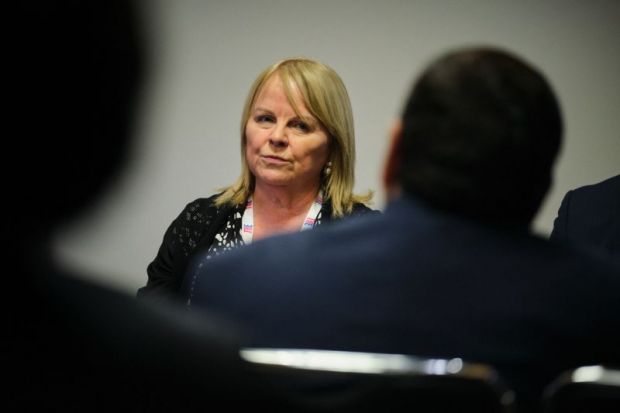The vice-chancellor of London Metropolitan University has highlighted the shocking level of deprivation facing some of its students, drawing attention to both the importance and the challenge of running a university focused on civic duty.
Lynn Dobbs told Times Higher Education’s THE Live event that there were huge issues with housing, violent crime and substance misuse in the university’s local area of Islington, adding that some students had been murdered while others were homeless while studying.
“London Met students have massively complex lives and social challenges. A lot of them are homeless – and I’m talking about some of them, when the library closes, heading off on to the street. They have very complex caring arrangements. They almost all…juggle work and study,” she told delegates.
“Some of our students have been murdered in Islington,” she continued. “We’re talking about really significant challenges facing the local community.”
As such, London Met was a “key linchpin institution” in the London boroughs of Islington, Tower Hamlets and Hackney, Professor Dobbs said, adding that most of the students from these boroughs would not go to universities “if they didn’t go to London Met”.
During a panel discussion on the civic duty of universities, Professor Dobbs, who is from Newcastle and was deputy vice-chancellor and provost at the University of Roehampton before taking over London Met last year, admitted that it took her “a while…to realise just how important every individual university in London is”.
“There is a bit of a tendency to lump us all together and imagine that if one wasn’t there, the students would just head off to the other universities,” she said. “It took me a while to realise that each university was part of the social ecosystem of [their local community], particularly the modern universities, and particularly universities like London Met, where we take a lot of students from the local area and through clearing.”
Professor Dobbs added that London Met greatly benefited from the fact that many local institutions and councils were keen to work with the university – a feature she believed was less common at Roehampton and Newcastle.
“The partners in Islington, Tower Hamlets and Hackney, and actually even more widely – [such as the] City of London Corporation and Metropolitan Police – they are all really interested in tackling the sorts of issues that matter to London Met,” she said.
When asked whether it was possible for universities to reconcile their civic duty with the need to survive in a higher education market, Professor Dobbs said there was increasing demand for universities to have a social mission.
“The way that we are adding social values into the curriculum is very popular among many potential students and is certainly driving huge recruitment increases from America, and [further education] colleges are partnering with us because of it,” she said.
“I think you can make it commercially worthwhile, although we are not doing it for that reason.”
Register to continue
Why register?
- Registration is free and only takes a moment
- Once registered, you can read 3 articles a month
- Sign up for our newsletter
Subscribe
Or subscribe for unlimited access to:
- Unlimited access to news, views, insights & reviews
- Digital editions
- Digital access to THE’s university and college rankings analysis
Already registered or a current subscriber? Login









